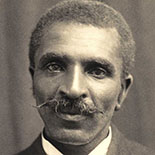 George Washington Carver (c. 1860 – January 5, 1943), was an American botanist and inventor. The exact day and year of his birth are unknown; he was born into slavery in Missouri, either in 1861, or January 1864.
George Washington Carver (c. 1860 – January 5, 1943), was an American botanist and inventor. The exact day and year of his birth are unknown; he was born into slavery in Missouri, either in 1861, or January 1864.
Carver’s reputation is based on his research into and promotion of alternative crops to cotton, such as peanuts, soybeans, and sweet potatoes, which also aided nutrition for farm families. He wanted poor farmers to grow alternative crops both as a source of their own food and as a source of other products to improve their quality of life. The most popular of his 44 practical bulletins for farmers contained 105 food recipes using peanuts. He also developed and promoted about 100 products made from peanuts that were useful for the house and farm, including cosmetics, dyes, paints, plastics, gasoline, and nitroglycerin. He received numerous honors for his work, including the Spingarn Medal of the NAACP.
During the Reconstruction-era South, monoculture of cotton depleted the soil in many areas. In the early 20th century, the boll weevil destroyed much of the cotton crop, and planters and farm workers suffered. Carver’s work on peanuts was intended to provide an alternative crop.
He was recognized for his many achievements and talents. In 1941, Time magazine dubbed Carver a “Black Leonardo”.